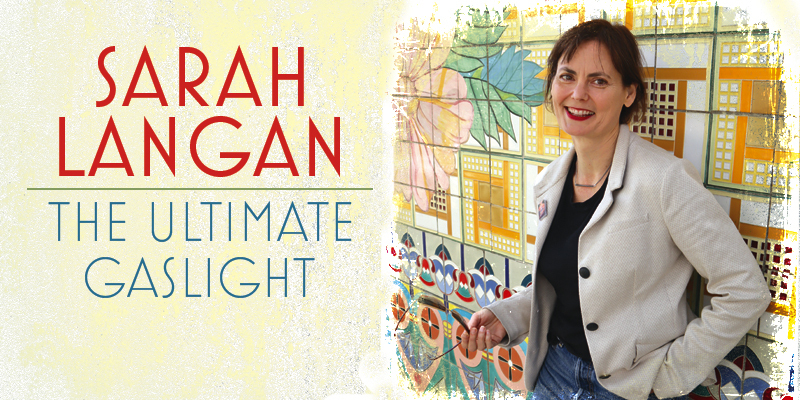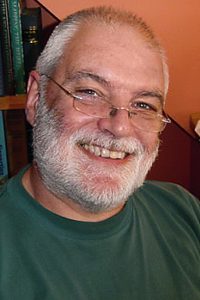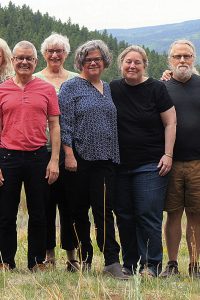Sarah Langan: The Ultimate Gaslight
SARAH LANGAN was born in 1974 and grew up in Long Island NY. She attended Colby College in Waterville ME, earned an MFA from Columbia University in 2000, and an MS Environmental Health Science from NYU in 2012. She lived in Brooklyn NY before relocating to Los Angeles CA, where she resides with her husband J.T. Petty and their children.
Langan began publishing work of genre interest in 2000, with around 30 stories appearing in anthologies and magazines since then, including Bram Stoker Award winner The Lost (2008).
Her Stoker Award-winning debut novel The Keeper appeared in 2006, followed by sequel The Missing (2007; AKA Virus), which also won the Stoker. Other books include Stoker Award winner Audrey’s Door (2009), near-future SF/horror novel Good Neighbors (2021), and her latest book, near-future thriller A Better World (2024).
Langan was one of the founders of the Shirley Jackson Awards, and served on the jury and on the board of directors.
Excerpt from the interview:
“When I was very little I wrote stories, but then I got scared about writing and I stopped, and just read a lot and took journalism. I didn’t write again until I was in college. I went to my college specifically because they had a creative writing program, and it was really hard to get into. You know the type – they’re so elitist, those programs. I had to fight really hard because I wanted to be a doctor at the same time to support myself, so I had a premed major, and they wouldn’t let me in. They said, ‘If you’re premed, you can’t take this – you have to be an English lit major.’ I had to switch my major to English lit to make them happy and get into the creative writing program. I don’t think they’re like that anymore, but creative writers in academia were a silly bunch of guys back then, who were writing a lot of Richard Ford’s Independence Day over and over again. But I got into the program, and wrote my first short story my sophomore year in college, and then I never stopped. I wrote every day after that.
“When people say, ‘I had to suspend my disbelief because something supernatural happened in the story’, that’s an argument that doesn’t make sense to me, because the whole act of reading is a suspension of disbelief – it’s a kind of conjuring in itself. I don’t know why imagining some person like Anna Karenina is possible, but they can’t imagine if Anna Karenina fell down a sinkhole. It’s strange.
“It’s rare that I seriously discuss my work. I’m usually like, ‘It’s fun! It’s sexy! It’s soapy, it’s scary!’ I don’t usually say more than that. A lot of genre is just genre – and it’s excellent. You know going into it what it is, but with my work, you don’t know what it’s going to be right away, and that can be very upsetting for people.
“I think what makes something ‘horror’ or not is a marketing question, and I have not been able to answer it myself, and I don’t know that anyone has. Good Neighbors sold so well to women, and to people who don’t read horror, and they really liked it. I got a ton of one-star reviews, but also a ton of five stars. I love horror, and I’d be happy if my books said ‘horror’ on the cover… if I knew the horror fans weren’t going to say, ‘I didn’t like this – there wasn’t enough blood and guts.’
“I think some of the reason people don’t know how to categorize my work is because I haven’t taken a lead. I’d call it literary horror – wherever you’d stock Shirley Jackson.
“When I started A Better World, I wanted to continue in the vein of Good Neighbors – this notion of a suburban melodrama gone very, very wrong.
“When I finished the first draft of A Better World, I handed it in to everybody in my writing group and said, ‘It’s not working yet.’ They said, ‘It’s working – the plot’s fine.’ I asked, ‘Did you want to cry or throw up at the end?’ They said no. I told them, ‘If you don’t want to cry or throw up at the end, I’ve failed.’ People approach the work in so many different ways – it could be a fun ride. But I don’t want to write a fun ride.
“For A Better World, I came up with this idea of gaslighting in a marriage, and I had this relationship between the main characters Linda and Russell, and I wanted a slow evolution to happen where they both came to understand that the system oppressing them had defined their relationships and their identities – more so Linda, because she’s the one who always has to surrender herself, whereas Russell is given the room to do what he wants, because of his gender.
“I went to StokerCon two years ago in Denver, and I was on this panel with Steve Rasnic Tem, and someone brought up gaslighting. Then someone next to me – a guy – made a joke. ‘Gaslight? We don’t gaslight you.’ I thought, ‘It’s tired, dude. It’s so fucking tired.’ Steve Tem said, ‘The problem is, we don’t know we’re doing it.’ Thank you! That’s the problem.
“The movie Gaslight is about a malignant person who wants to commit harm to get money, and he thinks the story is all about him, and he doesn’t have empathy. He tries to drive Ingrid Bergman insane. That’s not what gaslighting means in the modern sense. In the modern sense, it means someone saying, ‘I’d like to do this tonight,’ and someone else saying, ‘Yeah, but you don’t get to pick, I do. It’s my turn, and I’m not paying attention to who picked last.’ It’s about a lack of equality, and both parties accepting the lack of equality, because they can’t even see it.
“My idea was that I would have Linda slowly come to recognize the situation she was in. But I thought that idea was too simple – not enough monsters. The other problem was, there was something I wasn’t seeing, because I was too much in my own point of view. I realized there was a bigger gaslight happening, and it’s the corporation gaslight – the capitalism gaslight. Then I thought, what if instead of making the husband a villain like Guy Woodhouse from Rosemary’s Baby, I made him a really sympathetic person instead, really devoted, and it’s just that they’re coming at their relationship from very different perspectives? They both have good points, but they’re trapped in a system where they can’t win.
“I set it in the future because I wanted to put the reality we’re in right now in context. People keep trying to write about now, and they’re unable to, so they set things back 20 years, and they get into nostalgia, or they go into the future – which is a little bit what I did. Or else they pretend our present didn’t happen at all, and they write these closed-box stories, instead of depicting a really frayed understanding of reality. Our reality is frayed coming out of COVID, and there are people who are still clinging to COVID and don’t want to come out of it. We have a human need to talk to each other, be in rooms with each other, and actually touch each other – and if that doesn’t happen, we don’t see our experiences as really real. Things that only happen online are unfulfilling, and emotionally, maybe even mentally, they make us a little bit sick.
“I wanted to have this social upheaval, so I set the story 40 years ahead, to a time when unemployment is at 25% and everything is falling apart. My main character, Linda, works at a free clinic as a pediatrician. She’s not the breadwinner, her husband is, and then he gets fired from the EPA, and they’re scared. In Klara and the Sun by Kazuo Ishiguro, people just start disappearing. Where do they go? I was thinking of that, a little bit – there are just these disappeared people. My husband and I were in Brooklyn raising our kids, and everyone had shaggy hair, and we were exhausted just trying to get by. Everyone was like, ‘How are you making ends meet? How are you doing this?’ People would just drop out. Where did they go? In my novel it’s a question of, ‘What will happen to this family? Will they lose their home? Are they going to live in their car?”’
“When they get this job offer from Plymouth Valley, they have to take it – it doesn’t matter what the job is. They move to this cloistered-community company town that has all these strange rules, and where the people have been living for generations. The locals are odd, as you would be, if you’d only known privilege. They’re insular, and they’re not nice to newcomers, but my family, the Farmer-Bowens, are like, ‘We’ll figure it out. It’s got clean air, it’s got food – this is where we belong.’
“But then Linda goes out with the most important women in the town, and while she’s out with them, this strange woman named Gal Parker appears and razzes everybody and gives them a hard time. She’s the tragic story of Plymouth Valley, who’s been kicked out of the community and will have to leave soon. Later that night, Gal does something incredibly violent and awful, and it hints at this volcano of terrible hidden under the town, and Linda can’t help but investigate. The more she investigates why Gal committed this violence, the more she begins to understand that Plymouth Valley is a really bad place – at which point, her family life starts to fray. Everyone has different ideas about what they should do about the situation, and they begin to ask themselves, ‘How much are we willing to take?’
“That’s one of the central questions of dystopian fiction right now, and I hate the answer the mainstream gives, which is: ‘You can do anything for your family. It’s okay to burn down the world if you need asthma medicine for your kid. It’s all okay.’ It’s actually not, and you’re not making the world better. You’re not even making your kids better – you’re not doing the right thing by them. It’s such male fantasy stuff. There are all those movies where, conveniently, Mom is dead, and now Dad has got to take care of the kid, and says he’ll do anything for that kid, but actually doing the day-to-day work of parenting is unfathomable.
“When Linda comes to her husband Russell with her concerns, he’s the one making the money. She says directly to him, ‘I’ve got these issues with something going on,’ and he just shuts her down. That’s super common. I had women approach me after reading the book, asking: “How did you know?” We live in a post-#MeToo era, but somehow we still feel alone, like we’re the only ones going through this stuff.
I was writing toward that moment where the kids are talking and the parents overhear them, and they realize what they sound like, and what they seem like.
“In the end, they find out that despite her expulsion, Gal’s fine, and has been living in a halfway house, because the people on the outside who hate Plymouth Valley for its privilege and exclusivity are still willing to take care of the rejects of Plymouth Valley because they’re decent, once you get down to the individual level. The ending was, ‘This is just what you didn’t see.’ I did change the ending so readers kind of knew Linda would live. I just wanted her to. Maybe it was a risky move, but maybe risks pay off. I got a letter from a fan about the ending who wrote, ‘You meandered. You shouldn’t have done this. You ruined the book.’ I thought: Did I really fail if I got this kind of reaction? But my husband said it too – he said, ‘You should cut that. Don’t put that in.’ But I think what’s surprising about reality is how often people do the right thing. We’re predisposed to imagine the worst thing, because it’s just easier to get ourselves used to it before it happens, and then we actually make that thing happen. What Linda keeps realizing through the book is that there are actually plenty of opportunities and options that she was blind to before. She meets her boss, this doctor coming from the Great Lakes, and he’s says it’s ‘a fine place to wait out global warming.’ She could totally be a doctor there. She could go back to New York. She could work exactly where she was and just live in the clinic with her family until they figure it out. As the book is going, we have these little moments where we see what the scientists are up to, and they’re willing to risk their lives to do the right thing. There are so many people like that, who are redemptive to this country, and to this society, and we don’t talk or know about them because they’re not rich.
“I was never going to take the moral out of the book. People say I wrote a satirical dystopia, but how is what I wrote different from reality? I’m not sure. I was talking to this person interviewing me on a radio show, and he said, ‘This is just what I see. I don’t know why people call it a satire, because it’s just what I’m living.’ I don’t know, either. We’re not going to be able to stop algae blooms and bad air and a lot of other repercussions from global warming. I was being generous setting that book 40 years from now; it’s sooner.
Interview design by Francesca Myman
Read the full interview in the August 2024 issue of Locus.
 While you are here, please take a moment to support Locus with a one-time or recurring donation. We rely on reader donations to keep the magazine and site going, and would like to keep the site paywall free, but WE NEED YOUR FINANCIAL SUPPORT to continue quality coverage of the science fiction and fantasy field.
While you are here, please take a moment to support Locus with a one-time or recurring donation. We rely on reader donations to keep the magazine and site going, and would like to keep the site paywall free, but WE NEED YOUR FINANCIAL SUPPORT to continue quality coverage of the science fiction and fantasy field.
©Locus Magazine. Copyrighted material may not be republished without permission of LSFF.








